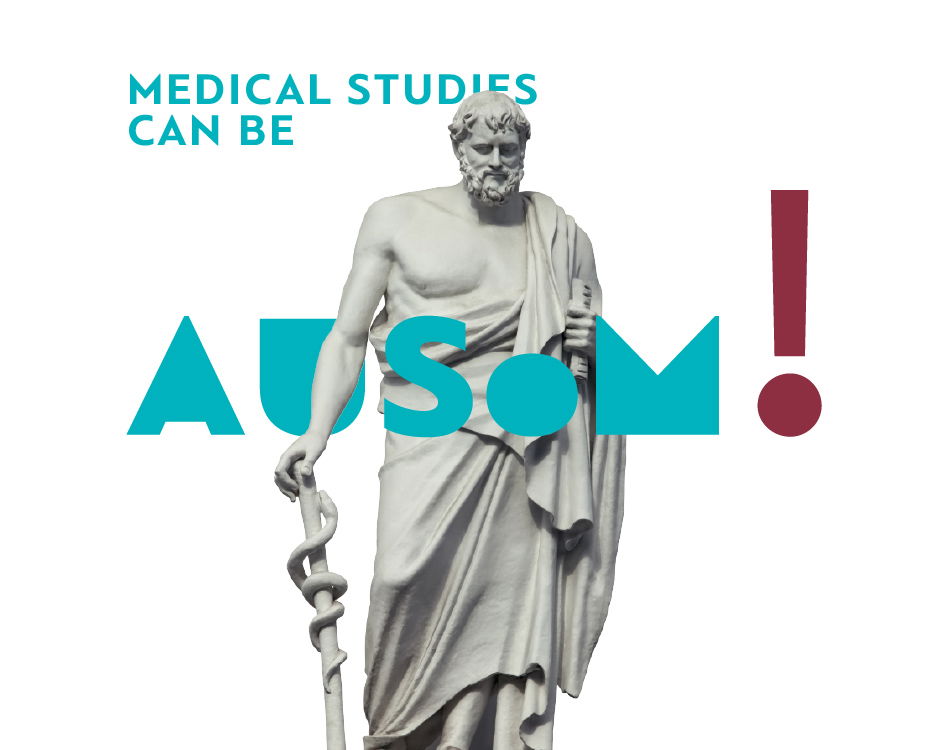Did you know that Greece is the birthplace of Hippocrates, the father of medicine? If you also aspire to study medicine abroad, this often-overlooked destination should be on your radar. Greece is a country that combines the best of both worlds: a high-quality and accredited education, and a low-cost and enjoyable lifestyle.
It's true: MBBS programs (Bachelor of Medicine and Bachelor of Surgery) in Greece are among the most affordable and accessible in Europe! Greece has a rich history and culture of medicine, dating back to ancient times, recognized universities and renowned professors, and comprehensive training in public and private hospitals. As an MBBS graduate in Greece, you will earn a high-quality degree that is valid across the EU and beyond.
Want to Start an Application? Book a Call with Global Admissions Here!
Studying MBBS in Greece can be a rewarding and affordable option for international students who want to pursue a career in medicine and health care. In this guide, we will cover everything you need to know about studying MBBS in Greece, including the entry requirements, the tuition fees, scholarships, the top universities, career prospects, and life in Greece.

About MBBS Programs in Greece
Greece offers high-quality education at accredited universities. As Greece is in the EU, all universities are part of the Bologna Process for ECTS credits and students can participate in the Erasmus+ Program. Living and studying in Greece is also very affordable compared to other European countries.
An MBBS degree in Greece requires six years of study, and leads to the qualification of a medical doctor.
The programs are usually divided into three phases: the pre-clinical phase (first two years), the clinical phase (third and fourth year), and the practical year (fifth and sixth year). The curriculum combines theoretical and practical learning, offering direct contact with patients from the first term.
You also have the option to do an intercalated degree in a related field after the second or fourth year of study. This is a one-year degree that allows students to explore a specific area of interest in depth, such as biomedical sciences, public health, medical humanities, or medical education.
Where is an MBBS Degree from Greece Recognized?
The MBBS degree in Greece is valid and recognized across the EU and beyond. The qualification also meets the standards and requirements of the World Health Organization (WHO) and the World Federation for Medical Education (WFME).

Why Study MBBS in Greece?
There are many reasons why studying MBBS in Greece can be a great choice for aspiring doctors. Here are some of the main benefits of studying MBBS in Greece:
- High-quality and affordable education
- EU-recognized and accredited degree
- Theoretical and practical learning
- Opportunities to do an intercalated degree in a related field
- Exposure to a variety of medical specialties and cases
- Enjoy the beautiful and diverse natural environment:
- Experience the friendly and hospitable Greek culture and people

Top Universities for MBBS in Greece
Greece has several universities that offer MBBS programs, with different rankings, specializations, and reputations. Here are some of the top universities for MBBS in Greece.
- National and Kapodistrian University of Athens
- Aristotle University of Thessaloniki
- University of Crete
- University of Patras
- University of Ioannina
- Harokopio University of Athens
English-Taught MBBS Programs
While most universities conduct their teaching in the Greek language, there are a few options for highly-rated MBBS programs that are taught entirely in English:
- The National and Kapodistrian University of Athens launched its first 6-year Medical Degree in English in 2023.
- The Aristotle University of Thessaloniki offers a 6-year Medical Degree in English.
- The University of Crete offers an interdisciplinary International Program in Medicine, also lasting 6 years.

Application Process for MBBS in Greece
The entry requirements for MBBS in Greece vary depending on the university and the student’s nationality. However, some general requirements apply to all international applicants. Here are the main entry requirements for MBBS in Greece:
Entry Requirements
You must have completed your secondary education and obtained a high school diploma or equivalent qualification. The minimum grade required for admission is 10 out of 20, according to the Greek grading system.
MBBS programs often require you to have taken subjects such as biology, chemistry, physics, and mathematics in your high school curriculum.
Some universities may require you to take the Test for Medical Studies (TMS), which is a standardized test that assesses your aptitude and skills for medical studies.
Language Proficiency
To study MBBS in Greece, you should have a good command of the Greek language, as the primary language of instruction is Greek (except for the English-taught programs mentioned above). Some universities offer Greek language courses to help.
You will be asked to provide a certificate of Greek language proficiency, such as the Certificate of Attainment in Greek, which is issued by the Centre for the Greek Language, or the Certificate of Greek Language Proficiency, which is issued by the Hellenic American Union.
Some universities may also accept other certificates or tests, such as the TOEFL, IELTS, or Cambridge English exams, as proof of English language proficiency, as some courses or electives may be taught in English.

Application Dates and Deadlines
The application process usually takes place in July of every year, and the results are announced in September.
You can apply to your chosen program through the Global Admissions platform.
Required Documents
Students must submit the following documents along with their application. Documents need to be translated into Greek and certified by a Greek diplomatic authority or the translation service of the Greek Ministry of Foreign Affairs.
- Two passport-sized photographs
- A secondary education certificate
- A certificate issued by the relevant educational authority in your country of origin, confirming you are eligible for higher education in your home country
- A certificate of citizenship and origin of the student and their parents
- A formal statement that the student has not previously enrolled in a Greek university or obtained a degree from a Greek higher education institution
- A certificate of Greek language proficiency, or other language certificates or tests
- A copy of your passport or identity card
- You may be required to pay a non-refundable application fee, which varies depending on the university and your nationality. The application fee covers the cost of evaluating the student’s qualifications and eligibility for admission.
Tuition Fees and Scholarships for International MBBS Students
The tuition fees for MBBS in Greece are free or very low, depending on the university and the student’s nationality.
EU students can study medicine for free in Greece, as they are considered equal to Greek students.
Tuition fees for Non-EU students can range from €1,500 - €6,000 per year. This varies depending on the university and your nationality.
International students have a few options for scholarships and financial aid to study MBBS in Greece, These include:
- The Greek State Scholarships Foundation (IKY): the official organization that grants scholarships to Greek and foreign students for undergraduate and postgraduate studies in Greece and abroad.
- The Erasmus+ Program: the EU’s program for education, training, youth, and sport. The Erasmus+ Program offers grants for students who want to study or do an internship in another European country for a period of 3 to 12 months.
- The Onassis Foundation: a private foundation that grants scholarships to Greek and foreign students in various fields of study, including medicine.
- The Fulbright Foundation in Greece: available to certain nationalities.
- University Scholarships: offered by specific universities for international students.
Career Prospects for an MBBS from Greece
MBBS graduates in Greece have a variety of career prospects, both in Greece and abroad. Here are some of the main career options for MBBS graduates in Greece:
1. Practice medicine in Greece
As an MBBS graduate in Greece, you are qualified and licensed to practice medicine in the country. You can work as a general practitioner or specialist in public or private hospitals and clinics, or open a practice. The average salary for a doctor in Greece is €36,000 per year.
2. Practice medicine in the EU or other countries
MBBS graduates in Greece can practice medicine in the EU or other countries, as their degree is recognized and accredited across the EU and beyond. The average salary for a doctor in the EU is €60,000 per year, while the average salary for a doctor in other countries varies depending on the country and the specialty.
3. Pursue a career in research or academia
With your strong background in scientific research and clinical experience, you could aim for a career as a researcher or professor in universities, or within the pharmaceutical or biotechnology industry. The average salary for a researcher or a professor in Greece is €25,000 per year.
4. Pursue further education
Narrow down your career path with further education and training in your field of interest, such as a master’s or a doctoral degree, or a residency or a fellowship program. You may choose to do this in Greece, Europe, or any other country worldwide.

University of Patras
Life in Greece
Living in Greece can be a rewarding and affordable experience for international students who want to pursue a career in medicine and health care. Here are some aspects of life in Greece that you should know.
Greek Culture
Greece boasts a rich and influential tradition of medicine that dates back to ancient times. It is renowned as the birthplace of Western civilization, democracy, philosophy, literature, and much more. The Greek culture is a blend of Eastern and Western influences, shaped by various historical events and influences. Greeks take great pride in their culture and heritage, expressing it through art, music, literature, cuisine, festivals, and religion. They are known for their warm hospitality, friendliness, and strong emphasis on family, friendship, and joy.
Environment
Greece is a country with a beautiful and diverse natural environment, with many islands, beaches, mountains, and forests to explore. Studying here can be a wonderful experience if you love nature and outdoor activities. The country has a mild and sunny climate, with four distinct seasons.
Cost of Living
The cost of living in Greece is relatively low compared to other European countries, especially if you live in smaller cities or rural areas. You can expect to spend anywhere from €300 to €800 per month.
The average cost of living in a city such as Athens is only €700.
Language
The official language of Greece is Greek, which is a descendant of the ancient Greek language. Greek is spoken by almost all of the population, and is the primary language of instruction in most universities. However, some courses or electives may be taught in English, and many Greeks also speak English as a second language.
Transportation
Greece has a well-developed and modern transportation system, with options including buses, trains, metro, trams, taxis, and ferries. Public transportation in Greece is reliable, frequent, and affordable, and covers most of the country. Taxis are convenient and relatively cheap, especially if you share them with other passengers. Ferries are the best way to travel between the islands and offer scenic views and comfortable facilities.
Healthcare
Greece has a universal healthcare system, which provides free or subsidized healthcare services to all citizens and residents. The quality of health care in Greece is generally high, and the medical staff are well-trained and experienced. However, sometimes public hospitals may not be able to offer the same level of care as private hospitals, especially in rural areas. Therefore, it is recommended to have valid health insurance, either from your home country or from a private provider in Greece.
Food & Cuisine
The cuisine in Greece is a part of Mediterranean cuisine, influenced by various Middle Eastern cuisines. Greek dishes make use of olive oil, vegetables, herbs, dairy, bread, fish, and meat, and are often seasoned with oregano, garlic, and lemon. Some of the most popular dishes in Greece are moussaka, souvlaki, gyro, spanakopita, and feta cheese.

Apply to Study in Greece
Studying MBBS in Greece can be a rewarding and affordable option for individuals aspiring to pursue a career in medicine and healthcare. It is an excellent destination that offers high-quality and accredited medical education, a stunning natural environment, and a warm and welcoming culture. Graduates of MBBS programs in Greece have a wide range of career opportunities, both within Greece and internationally.
If you are interested in studying MBBS in Greece, you can browse and apply to programs through the Global Admissions platform.

